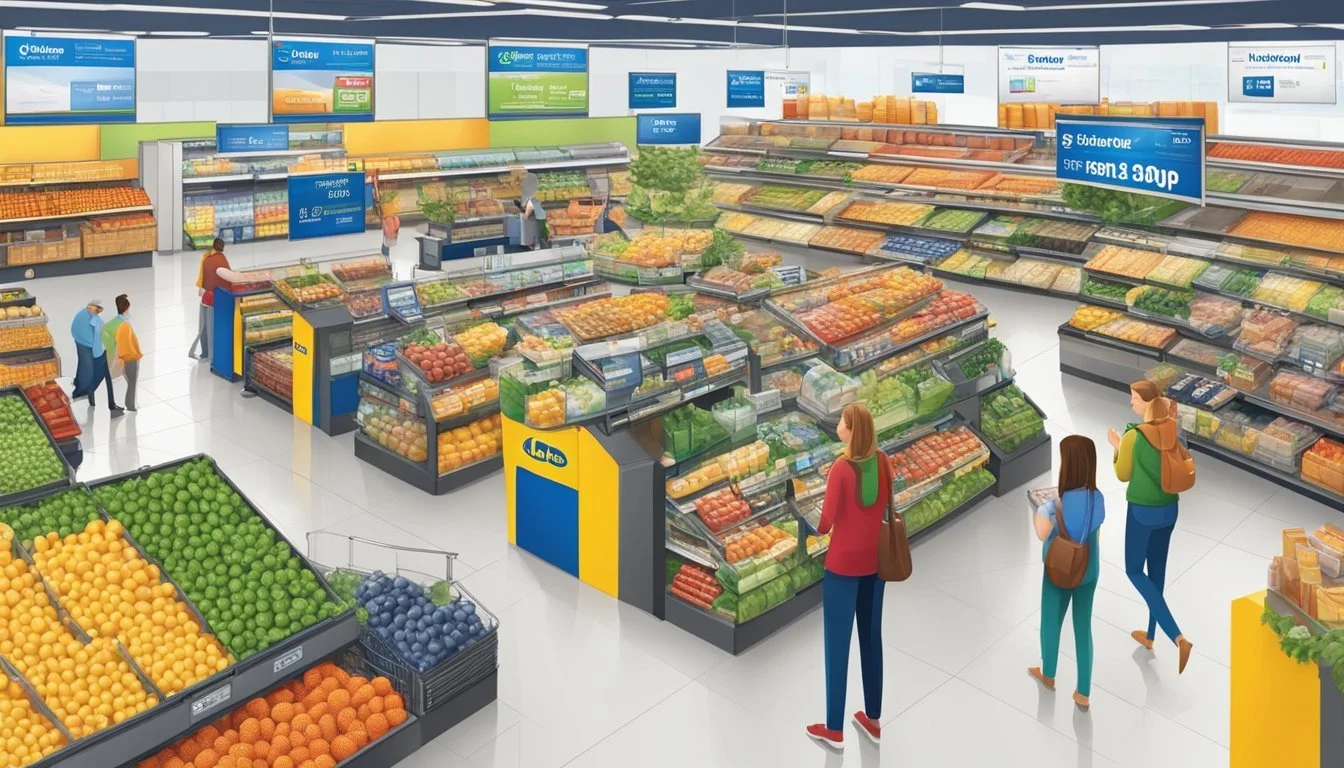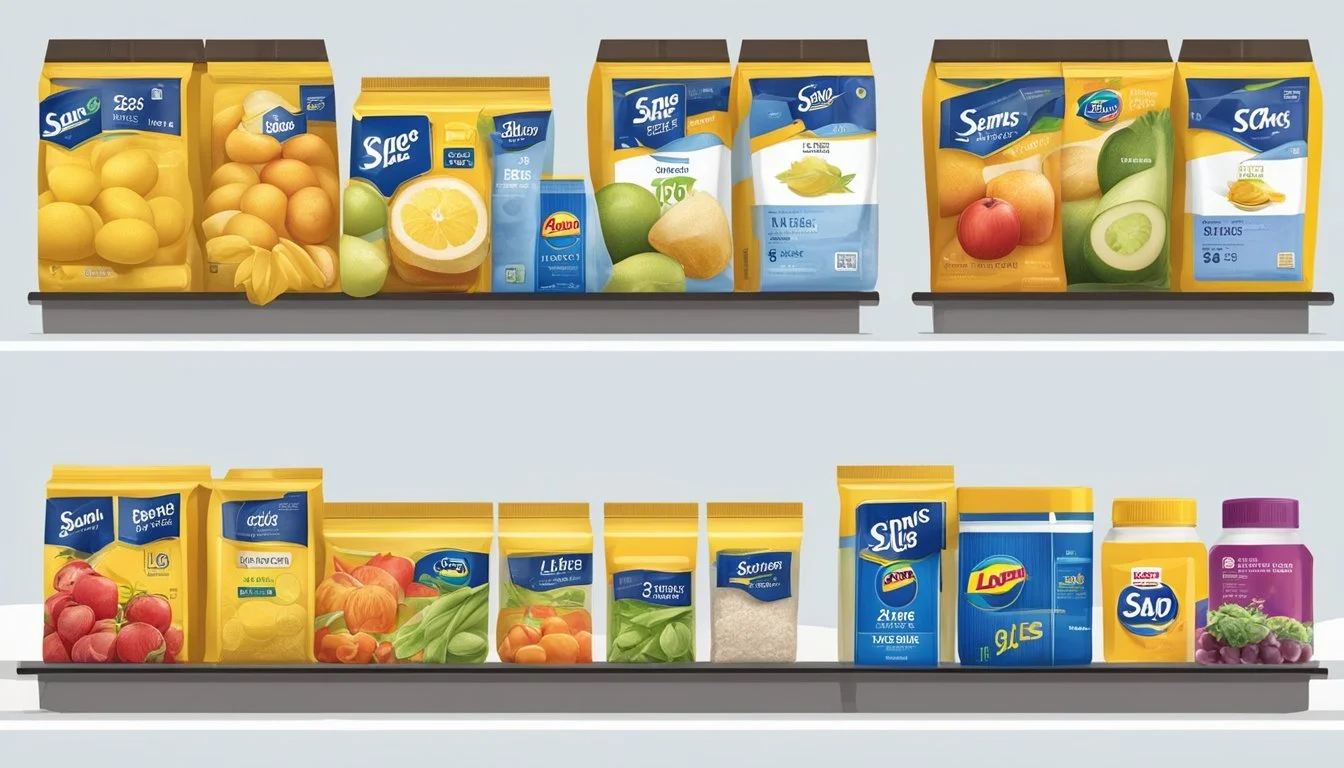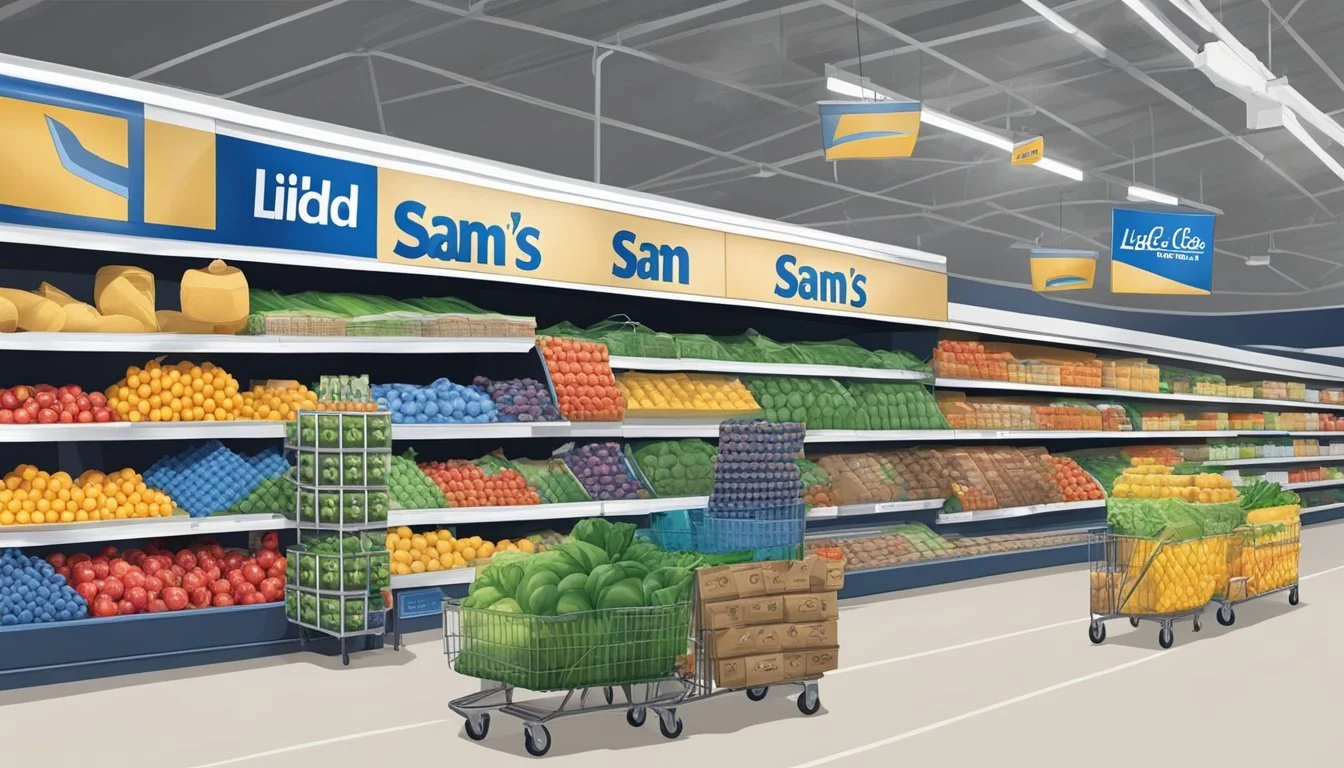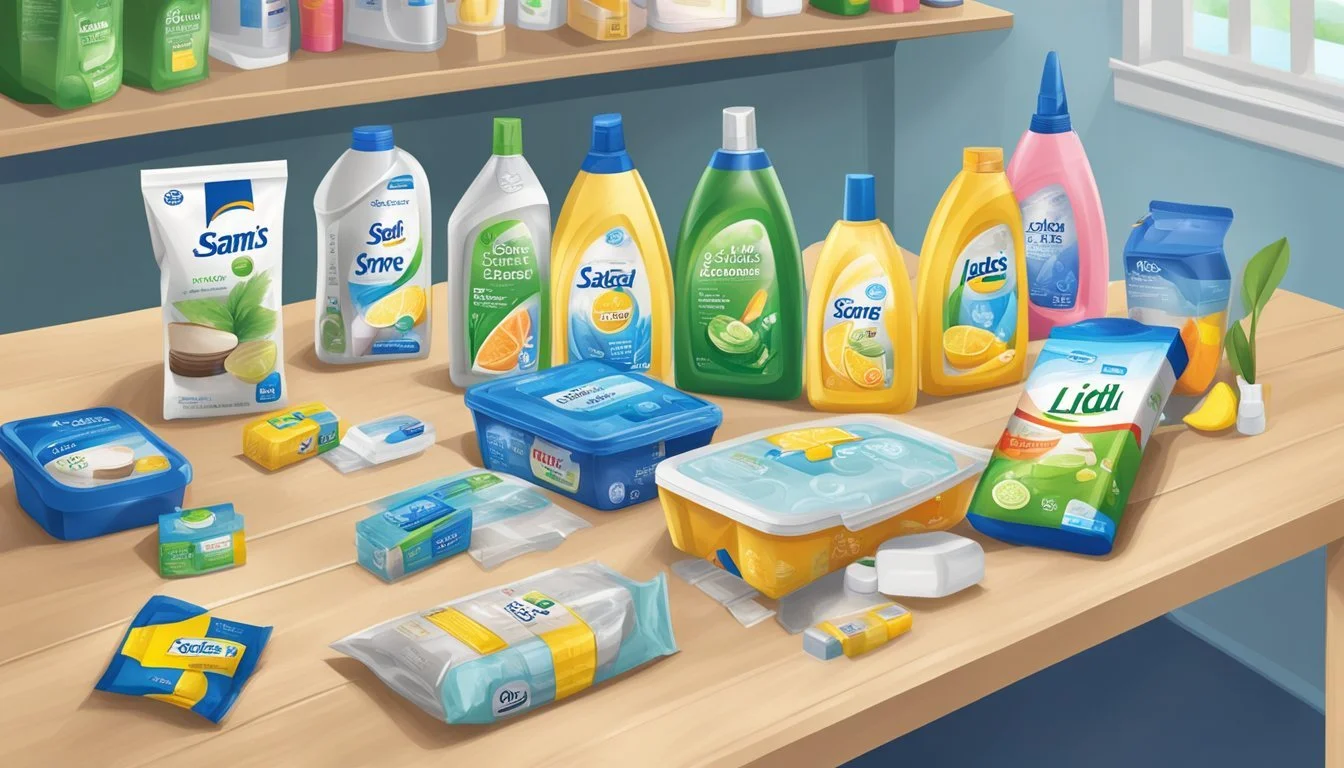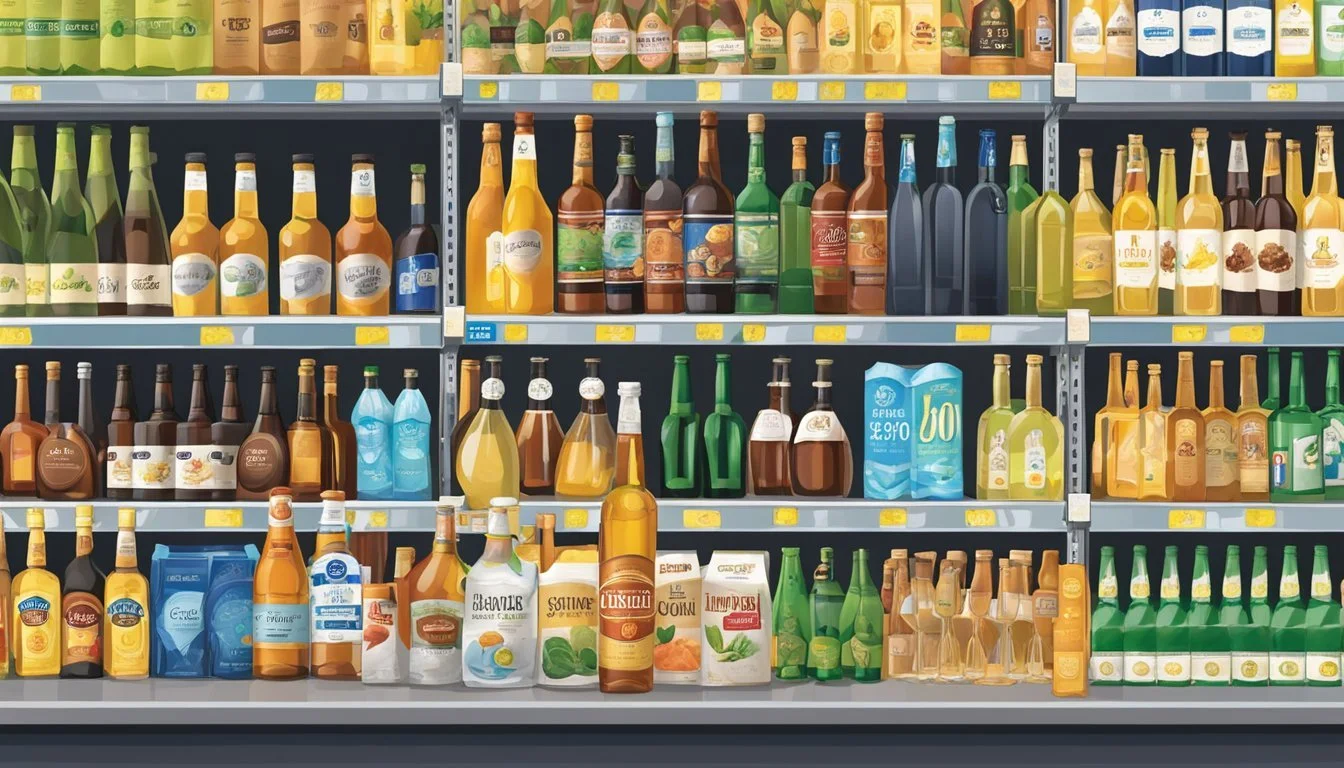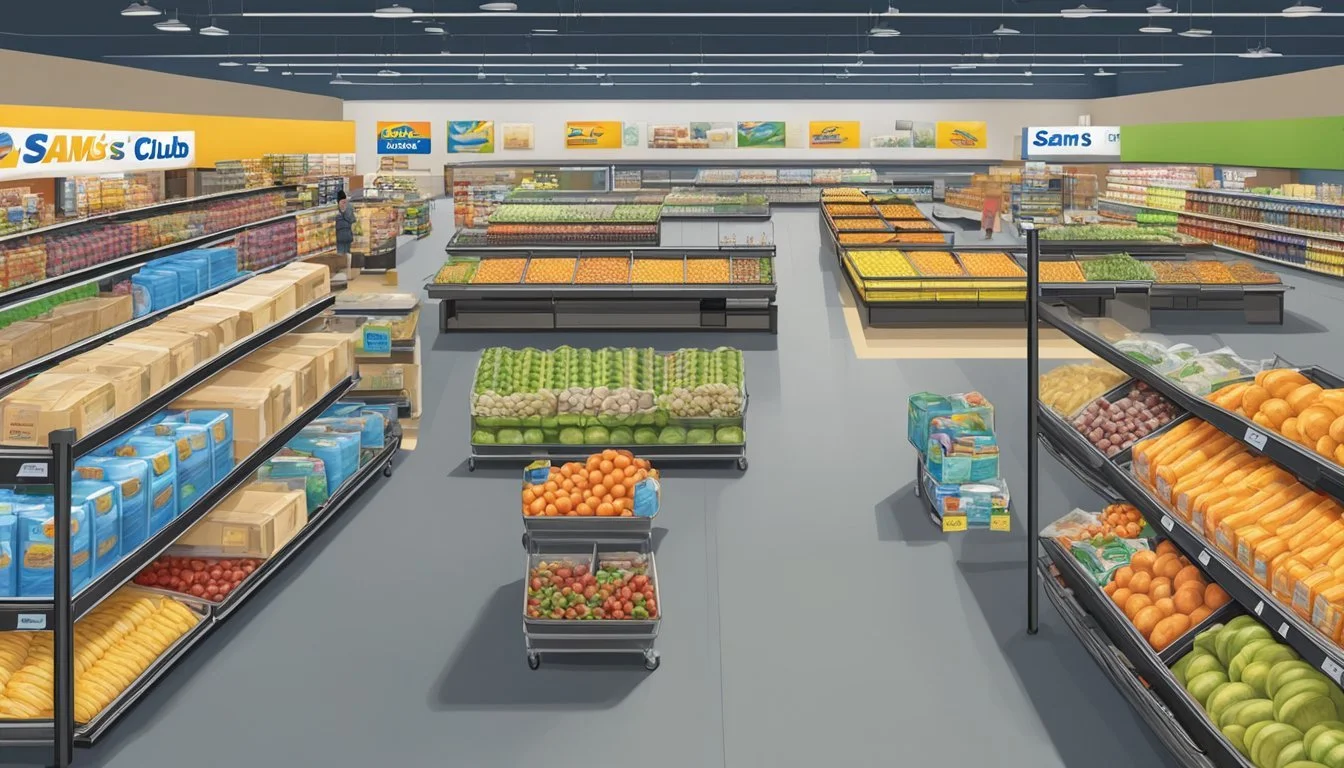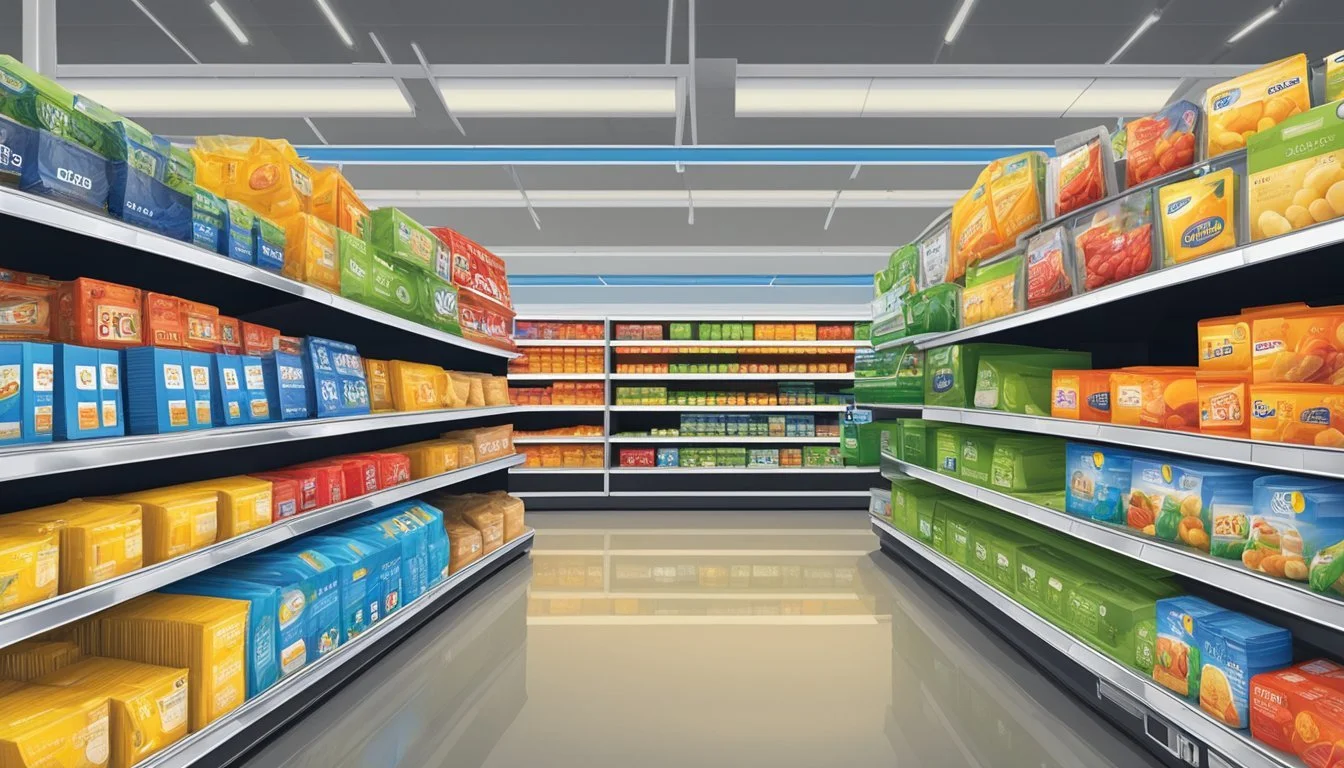Is Sam's Club Cheaper Than Lidl?
Comparing Prices and Value
Part of Our Grocery Store Guide with Details on Sam's Club Prices and Lidl Prices
When deciding where to do their grocery shopping, consumers often consider both the cost and the shopping experience. Sam's Club and Lidl are two retailers that offer distinct approaches to grocery sales. Sam's Club, a membership-based warehouse club, is known for offering items in bulk at discounted prices, promising significant savings over traditional retail pricing. Analysis suggests that for certain items, shoppers can expect to save approximately 30 to 40 percent compared to traditional supermarkets and about 20 percent compared to Walmart, which is Sam's Club’s parent company.
Conversely, Lidl operates on the model of a discount supermarket chain that focuses on efficiency and simplicity. Lidl’s model includes offering a limited selection of private-label brands and a store layout designed for quick shopping trips, enabling the company to pass the savings onto customers. This streamlined approach has positioned Lidl as one of the cheapest grocery stores, challenging the notion that membership-based wholesale clubs like Sam's Club always offer the best prices.
Deciding whether Sam's Club or Lidl is the more cost-effective option may depend on the shopper's preferences for buying in bulk, brand selection, and the importance of a quick shopping experience. This article aims to compare the two retailers based on pricing and other factors that influence the overall value provided to the consumer.
Understanding Sam's Club and Lidl
Sam's Club and Lidl are two prominent retail chains with differing business models catering to diverse shopping preferences. Sam's Club operates as a warehouse club, where customers can find a wide range of products in bulk sizes, often at discounted rates. A membership fee is required to shop at Sam's Club, providing access to its exclusive deals. The memberships come in different tiers, with the Plus Membership offering additional benefits such as early shopping hours and cash rewards.
On the other hand, Lidl is a grocery store known for its competitively priced items and an emphasis on store brands. Unlike Sam's Club, Lidl does not require customers to pay an annual fee to shop. They focus on a cost-effective shopping experience, often presenting a smaller store layout with a curated selection of goods.
When comparing the two, shoppers should consider:
Membership Fees: Sam's Club charges an annual fee, whereas Lidl does not.
Product Selection: Lidl offers a high percentage of store brands, while Sam's Club provides both bulk items and name brands.
Store Experience: The shopping experiences differ; Sam's Club emphasizes bulk offerings and members-only perks, while Lidl prioritizes straightforward, affordable shopping.
Customers should assess their shopping habits and preferences when deciding between the two stores. They each serve specific market segments, and the better choice varies based on individual consumer needs.
Price Comparisons
When examining prices between Sam's Club and Lidl, consumers often seek evidence of savings and lower prices. Sam's Club is a membership-based wholesale retailer, known for bulk items and exclusive member perks, including fuel savings. Members often find lower prices per unit on large quantities, potentially leading to significant savings over time.
Lidl, in contrast, operates a more traditional retail model with no membership requirement. It emphasizes affordability and was noted for maintaining the title of the cheapest grocery store, with a 2022 price comparison showing an increase in their affordability index from 66% to 69%.
A side-by-side comparison is essential for a precise price comparison. For instance, categories like groceries, electronics, and home goods may have varying price differentials. Lidl often competes with aggressive pricing strategies in the grocery sector, while Sam's Club might offer deeper discounts on bulk purchases that appeal to large households or businesses.
The cheaper alternative between the two largely depends on the consumers' shopping needs. Lidl's prices are competitive for single-item purchases and are typically favored for small-scale shopping. Conversely, Sam's Club could provide cheaper prices for bulk purchases, coupled with member benefits that Lidl does not offer.
Consumers can make informed decisions by examining specific price comparisons for products they frequently purchase. Here is a simplified view:
Item Type Sam's Club Lidl Bulk Groceries Generally Cheaper Single Items Often Cheaper Member Perks Available Not Applicable
Comparisons thus highlight the importance of context when shopping for the best value.
Membership and Fees
When comparing Sam's Club to Lidl, it's essential to consider the membership models that both retailers use. Sam's Club requires customers to purchase a membership to shop at their locations. They offer two main membership tiers:
Club Membership: Priced at $45-$50 annually, this basic level provides access to all club locations and other limited perks.
Plus Membership: Costing around $110 per year, this premium option includes extra benefits like cash back rewards and free shipping for online orders.
Lidl, on the other hand, operates without a membership fee, allowing shoppers to access their stores and discounts freely.
Here is a brief breakdown of the membership costs:
Retailer Membership Type Annual Fee Extra Benefits Sam's Club Club $45-$50 Access to locations Sam's Club Plus $110 Cash back, free shipping Lidl None $0 Open access to stores
Consumers must weigh these membership fees against potential savings. While Sam's Club offers bulk purchasing at discounted rates which can lead to savings, it's crucial to consider whether the membership fee justifies these savings. In particular, households that spend significant amounts on groceries and other goods at Sam's Club might find the membership costs worthwhile.
In contrast, Lidl customers don't encounter an upfront membership fee, positioning it as a more immediately accessible shopping option for those averse to paying for memberships. Lidl attracts customers with its low prices on many items, made possible due to its efficient operational model and no-frills shopping environment.
Product Assortment and Availability
When comparing the product assortment and availability between Sam's Club and Lidl, customers will find distinct differences shaped by the nature of each retailer's business model. Sam's Club, a membership-based wholesale warehouse, offers an extensive range of bulk items, often in larger quantities than typical supermarkets. This includes everything from produce to meat, dairy, and bakery goods. Their bulk-focused approach positions them well for consumers aiming to stock up on their grocery list with large quantities at lower prices per unit.
Lidl, on the other hand, operates smaller retail stores with a curated selection of products meant for more frequent shopping trips. Lidl's selection includes a variety of store brand and name-brand goods, emphasizing high-quality groceries, produce, meat, and dairy products. They also provide a range of bakery items and fruit, typically arranged in a manner conducive to a more traditional shopping experience compared to the warehouse style of Sam's Club.
In the non-food categories, Sam's Club extends its bulk-selling philosophy to the sale of clothing, appliances, and electronics, which can offer significant savings for customers making larger, infrequent purchases. Lidl's non-grocery assortment is more limited—though it occasionally offers special deals on select clothing items, electronics, and household goods, these items are not a consistent staple like at Sam's Club.
Customers creating a shopping list will find that Sam's Club's bulk offerings are ideal for those looking to restock less frequently, while Lidl's product assortment caters to shoppers who prefer buying their groceries in smaller quantities, more often, and with a focus on fresh quality.
Quality of Goods
When comparing the quality of goods at Sam's Club and Lidl, one should consider the range of products offered under their private labels, such as Member's Mark for Sam's Club and Lidl's store brand. Sam's Club's Member's Mark is known for its high-quality staples, with products ranging from meat and cheese to milk, butter, and yogurt. Their Kirkland signature brand often matches or exceeds the quality of comparable national brands.
Lidl, on the other hand, has gained a reputation in Europe and more recently in the US for offering quality goods at reduced prices. Their offerings include cereal, olive oil, and dairy products that many consumers find comparable to higher-priced supermarket brands. Additionally, Lidl offers a selection of clothing, which can vary in quality.
Meat & Dairy: Both retailers provide a variety of fresh meat and dairy products, with Sam's Club typically offering bulk packaging and Lidl providing smaller portions suitable for individual consumers or small families.
Household Items: As for essential household items such as toilet paper and diapers, Sam's Club's Member's Mark is often lauded for both quality and cost-effectiveness. The Kirkland brand is especially noted for its high-quality olive oil.
General Groceries: In regards to general grocery items, Lidl's store brand products such as cereal and butter are considered to deliver on both quality and value.
It's worth noting that experiences may vary depending on the specific item and personal preferences. Each store conducts rigorous quality checks to ensure that they provide reliable and satisfying products to their members and shoppers.
Shopping Experience
When comparing the shopping experiences at Sam's Club and Lidl, customers will notice several differences dictated by their operational models. Sam's Club, as a bulk-buying warehouse, typically offers a vast space with a wide variety of items sold in larger quantities. Here’s a breakdown of what shoppers might encounter:
Shopping Environment: Sam's Club warehouses are expansive, allowing for a wide range of products in bulk. Lidl stores are generally smaller with a curated selection of goods that focuses on efficiency.
Shopping Carts: Due to the bulk nature of items, Sam's Club provides robust, large-capacity carts. Lidl, catering to routine shopping, offers carts suitable for the average family grocery haul.
Scan & Go Technology: Sam's Club offers a "Scan & Go" feature through its mobile app, enabling customers to scan items as they shop and bypass traditional checkout lines. This convenience is a time-saving perk for buyers.
Curbside Pickup: Both retailers have embraced the trend of curbside pickup, providing shoppers with the convenience of ordering ahead and having their groceries loaded into their vehicles upon arrival.
Same-Day Delivery: For those requiring immediate delivery, Sam's Club has established a same-day delivery service for a range of items, which is particularly useful for time-sensitive purchases. Lidl also offers quick delivery options, facilitating an easy shopping experience for consumers.
In essence, shoppers at Sam's Club might favor the wholesale shopping experience with technology-driven conveniences, while Lidl customers may appreciate the straightforward, smaller-scale shopping setup with a focus on efficiency and quick trips. Each store’s offerings are tailored to meet different shopper needs.
Brand Comparisons
When considering grocery shopping options, consumers often weigh the cost-effectiveness of stores like Sam's Club and Lidl. Both stores offer unique advantages, with Sam's Club operating as part of the Walmart family, benefiting from Walmart's significant buying power. This results in competitive pricing for its private label, Member's Mark.
Lidl, on the other hand, is a retail chain that originated in Germany and provides shoppers with a selection of low-priced goods including their store brands, which compete with national brands in terms of quality and price. While Lidl is known for its lean store layouts to keep costs down, Sam's Club requires a membership fee to take advantage of its bulk purchasing discounts.
Price Comparison:
Sam's Club: Fusion of Walmart's supply chain efficiency, offers lower prices on Member's Mark items.
Lidl: Emphasizes affordability with competitive prices but lacks the bulk buying option.
Comparatively, Lidl does not provide the bulk-buying model that Sam's Club does, which can affect the overall savings for customers who shop in larger quantities. It's also worth noting that Aldi, a competitor of Lidl, has been recognized for its low prices, particularly when it comes to everyday grocery items.
In terms of wider market options, Costco is another player in the bulk-buying space, with its private label, Kirkland, being directly comparable to Sam's Club's Member's Mark. Consumers often evaluate these brands on factors such as product quality and cost-efficiency.
The choice between Sam's Club and Lidl may come down to the consumer's shopping preferences – whether they are inclined towards the bulk discounts offered by a wholesale club membership or the everyday low prices and smaller quantities at a discount grocery store.
Additional Services
Sam's Club not only caters to the daily grocery needs of its customers but also offers a variety of additional services that enhance the shopping experience and provide value-added benefits. These services are designed to save money and offer convenience for various aspects of life beyond basic shopping needs.
Pharmacy: Sam's Club operates full-service pharmacies for both members and non-members where they provide prescription medications at competitive prices. They also offer health screenings and immunizations, adding value for individuals who prioritize health services alongside their shopping.
Gas: Members can enjoy discounted rates at Sam's Club gas stations. Fuel prices are often lower than typical market rates, offering members significant savings over time.
Tires: Shoppers seeking automotive services can purchase tires from Sam's Club. Members benefit from tire installation services, which includes tire mounting, lifetime balancing and rotation, and flat repair.
Travel and Vacation Planning: Sam's Club provides members with a travel and vacation planning service. Members can book flights, hotels, car rentals, and vacation packages, often at discounted rates.
Service Category Highlights Gas Discounted fuel prices for members Tires Sales and installation services Travel Booking discounts on flights, hotels, and more
Theme Parks and Entertainment: Discounted tickets to theme parks, movies, and other entertainment venues are available, making leisure activities more accessible for families and individuals.
Dining: Sam's Club offers discounted gift cards for various dining establishments, helping members save on eating out.
Additional Services: Other services may include optical centers, photo printing, and more, depending on the location. These services contribute to making Sam's Club a one-stop-shop for a multitude of needs.
Each of these services is integrated into Sam's Club's approach to offer its members quality services at lower prices, affirming their commitment to providing more than just groceries but an encompassing membership experience.
Deals and Savings Programs
When comparing Sam's Club and Lidl, customers will find distinct approaches to deals and savings programs.
Sam's Club offers an Instant Savings program which provides limited-time promotional discounts directly loaded to a member's card. During the promotion, discounts are applied instantly at checkout. Additionally, they have a satisfaction guarantee policy, aligning with their focus on member benefits.
Coupons: Sam's Club occasionally sends out newsletter coupons to its members.
Free Shipping: Members with Plus level membership often enjoy free shipping on eligible items.
Executive Membership: Sam's Club offers different tiers of membership, with higher levels providing additional benefits and savings.
Return Policy: Sam’s Club's satisfaction guarantee ensures a user-friendly return process.
Lidl, on the other hand, may not offer a directly comparable savings program but aims to provide low prices storewide. Lidl's model focuses on efficiency and cost-saving, which allows them to keep their prices competitive.
Deals: Lidl regularly features weekly specials and discounted items.
Coupons: While not as reliant on coupons, Lidl does integrate them into their savings approach.
Satisfaction Guarantee: Lidl offers a hassle-free return policy, ensuring customer satisfaction with their purchases.
While both stores provide ways to save, they cater to different shopping preferences and the convenience of savings options may vary depending on individual customer priorities. Sam's Club leans into a membership-based model for securing deals, whereas Lidl maintains a straightforward low-cost strategy across the board.
Evaluating Consumer Policies
Consumer policies are pivotal in determining the value and flexibility offered by retailers. When comparing Sam's Club and Lidl, several aspects of their consumer policies stand out.
Return Policy:
Both retailers offer return policies aimed at customer satisfaction, but specifics vary. Sam's Club boasts a satisfaction guarantee, allowing customers to return items, with a few exceptions, at any time if they are not satisfied. Lidl's return policy typically permits returns within a specified period, providing a full refund with a receipt.
Payment Options:
A diverse range of payment options benefits the consumer by offering flexibility. Sam's Club and Lidl both accept a variety of payment methods. Major credit cards, including MasterCard, are welcomed, along with other forms of payment.
Credit Options:
Credit options such as store-branded credit cards are available. Sam's Club, in collaboration with Citi, offers a branded MasterCard that provides additional benefits like cashback on purchases. Lidl does not provide a store-branded credit card but does accept various credit cards for payment.
Satisfaction Guarantee:
Sam's Club's satisfaction guarantee is a demonstration of their commitment to customer service, reinforcing the value proposition for their customers. Lidl also values customer satisfaction but does not advertise a similar blanket satisfaction guarantee policy.
When considering policies, consumers should review the terms and conditions specific to each retailer for the most current and accurate information. The adequacy of consumer policies can greatly influence the shopping experience, so customers are encouraged to consider these facets along with pricing when choosing where to shop.
Online Presence and Digital Services
Sam's Club has fortified its digital services to enhance the shopping experience. They have developed a user-friendly app that allows customers to order a wide range of products, from electronics to books and toys, with the tap of a finger. The app also provides a convenient way to handle prescriptions, streamlining the process for pharmacy customers.
The club's online platform supports various payment options, making purchases smooth and secure. These options cater to a diverse customer base, ensuring flexibility and accessibility.
Moreover, their digital presence extends to Facebook, where they maintain active engagement with customers. This social-first approach helps them address customer inquiries swiftly and boosts customer satisfaction through prompt service.
Lidl, on the other hand, while recognized for its physical store presence, has a less dominant online footprint. Although Lidl has ventured into online offerings, their focus has traditionally been more on the in-store experience.
Feature Sam's Club Lidl App Available Limited Payment Options Multiple, including digital Traditional Prescriptions Streamlined on app In-store Online Shopping Extensive range of products Mainly in-store Social Media Active presence Developing presence
Sam's Club clearly prioritizes its online and digital presence, understanding its importance in the modern retail landscape. They leverage technology to provide a seamless and efficient shopping experience, whether customers are interacting with them on their app or through their online services.
Grocery Specifics
When comparing prices on grocery items, consumers look for the best value for their money. At Sam's Club and Lidl, the cost for various food staples may widely differ:
Rice: Generally, rice is more economically priced in bulk at warehouse clubs. Sam's Club offers larger quantities that may result in a lower cost per unit.
Ham and Ground Beef: Meat selections could cost less at Sam's Club, due to bulk packaging options that provide lower per-pound prices than traditional grocery stores like Lidl.
Boneless Skinless Chicken Breast: Price comparisons indicate that Sam's Club may offer the poultry staple at a discount thanks to their larger pack sizes.
On the other hand:
Canned Goods & Pasta: Lidl, known for its affordability, often features competitive prices for these pantry essentials.
Beans: For both dried and canned beans, Lidl might offer better pricing, particularly for shoppers who prefer smaller quantities.
For household basics and snacks, it's important to note:
Basics and Snacks: Memberships at warehouse clubs like Sam's Club often translate into savings on these items, but Lidl's everyday low prices are also a strong contender for cost-conscious shoppers.
Cleaning Supplies: Bulk purchases may lead to savings at Sam's Club, although Lidl's frequent discounts and special offers could narrow the price gap.
Lastly, considering ready-to-eat options:
Rotisserie Chicken: A popular item, warehouse clubs typically price rotisserie chickens lower as a lure for busy shoppers; Sam's Club is competitive in this category.
Cereal: Both stores offer various brands and sizes, with Lidl possibly having an edge with its lower-priced private labels.
Each store has strengths that cater to different shopping preferences and needs. Shoppers should assess both pricing and the quantity they require before making a purchase.
Personal Care and Household Items
When comparing Sam's Club with Lidl regarding the personal care and household items sector, one needs to examine individual product categories for clarity. For diapers and baby care, Sam’s Club often provides better value because of the option to buy in bulk. However, Lidl’s regular discounts and competitive pricing should not be overlooked, especially for parents looking for smaller quantities.
In terms of beauty products, Lidl offers competitive prices, but the range might be limited compared to Sam's Club. For those who prefer to purchase beauty items in larger quantities or seek out specific brand-name products, Sam’s Club might edge ahead.
Pharmacy and health segments see Sam’s Club offering a broad selection of prescriptions and wellness products, likely at lower prices given their robust supply chain and purchasing power. Lidl, however, may present limited options in its pharmacy section but can sometimes surprise consumers with its discounted drug prices during special sales events.
Regarding toilet paper and cleaning supplies, the choice largely depends on the consumer's preference for quantity and brand. Sam's Club excels in providing large packages that often equate to lower costs per unit. Lidl, contrarily, serves customers who do not desire to buy in such large volumes and might offer more European brands.
Diapers: Bulk purchasing options at Sam's Club.
Beauty: Brand variety at Sam's Club versus limited selection at Lidl.
Pharmacy: Lower prices at Sam's Club; occasional discounts at Lidl.
Toilet Paper/Cleaning Supplies: Large quantity savings at Sam's Club, smaller quantity options at Lidl.
Consumers must weigh these variables against their personal needs to determine which retailer suits their personal care and household item requirements best.
Specialty Items and Alcohol
When it comes to specialty items such as select cheeses and unique food products, Sam's Club offers an array of options that cater to both gourmet preferences and party planners. Members have access to a diverse selection of cheeses, ranging from aged cheddar to exotic imports like Manchego and Gouda. These cheeses not only complement wine choices but also serve as a versatile element for various culinary endeavors.
In terms of alcohol, Sam's Club typically provides a broad spectrum of options. Their inventory includes a variety of wines, ranging from everyday table wines to more premium selections. They have established a reputation for offering competitive prices on both domestic and imported wines. Additionally, their selection of spirits and beers caters to those seeking both popular brands and craft options.
Lidl, on the other hand, with its European roots, frequently showcases a curated selection of international specialty foods and beverages, which include European wines and unique cheese varieties. Their offerings are often at a lower price point, which can be particularly attractive for customers looking to experiment with new flavors without a significant financial commitment.
When consumers are choosing where to shop for specialty foods and alcohol, considerations often include price, variety, and the exclusivity of selections available. Below is a brief outline of what shoppers might find:
Specialty Items Sam's Club Lidl Wines Wide selection, including premium Curated international wines, affordable options Cheeses Diverse selection, gourmet options European varieties, competitively priced Specialty Foods Bulk quantities available Rotating selection, European focus Alcohol Broad range of spirits and beers Mainly European spirits and regional beers
Each store caters to different consumer needs, with Sam's Club focusing on bulk purchasing and Lidl offering European-centric selections at lower price points. Shoppers should consider their personal preferences and the specific items they are looking for when deciding between the two retailers for their specialty item and alcohol purchases.
Analyzing Shopping Trends
When it comes to shopping trends, consumers prioritize cost-effectiveness and convenience. Many shoppers gravitate towards Sam's Club for bulk purchasing, which can lead to significant savings in the long run, particularly for large households. They offer an array of products, including groceries, electronics, and clothing, which under one roof simplifies the shopping experience.
Conversely, Lidl, known for its discounted prices, operates on a smaller scale, focusing primarily on grocery items. Their business model emphasizes streamlined offerings and limited assortment, which may result in lower per-unit prices for consumers picking individual items.
Groceries: Sam's Club usually offers larger quantities at lower prices per unit, while Lidl's strength lies in affordable, smaller packages.
Electronics: Shoppers may find that large-scale retailers like Sam's Club provide a more diverse selection of electronics.
Clothing: Retail clubs tend to stock clothing in bulk, potentially offering a cost benefit to consumers.
Shoppers tend to pick Sam's Club when planning to stock up, as the club's pricing model is tailored to bulk buying. Lidl attracts consumers with its easy-to-navigate stores and quick shopping trips, primarily for food items.
Ultimately, the preference between Sam's Club and Lidl can be influenced by the shoppers' purchasing habits, whether they are stocking up for a future period or buying essentials for the immediate term. The trend leans towards Sam's Club for diverse, bulk purchases and Lidl for agile, grocery-centric shopping.
Purchasing Non-Grocery Items
When considering the purchase of non-grocery items such as clothes, appliances, electronics, tires, books, and toys, consumers often compare big-box retailers like Sam's Club and Lidl. Each store has its distinct advantages.
Clothing: At Sam's Club, the clothing selection typically includes bulk-packaged items or larger sizes, catering to those seeking value packs or discounts on higher quantities. Lidl, on the other hand, offers a more limited seasonal selection, focusing on affordability for individual pieces.
Appliances and Electronics: Sam's Club carries a variety of appliances and electronics, often showcasing the latest models and brands. They also frequently offer warranties and return policies that can provide additional peace of mind for these significant purchases.
Tires: Sam's Club is known for having competitive prices on tires, often including installation services and extended warranties. Customers can sometimes find savings compared to traditional tire stores or automotive shops.
Books and Toys: Both retailers offer an eclectic mix of books and toys, with Sam's Club often presenting items in bulk or in larger sets, which can lead to savings for consumers, and Lidl offering competitive prices on individual items.
In summary, Sam's Club generally positions itself as a membership warehouse club where bulk purchases translate into cost savings, especially for items like tires and large appliances. Lidl, a European-style grocery store, provides daily necessities including non-grocery items at competitive prices, though with less emphasis on bulk sales. Consumers should compare prices and consider their shopping needs—whether they seek individual items or larger quantities—to determine the best value.
Benefits of Bulk Purchasing
When consumers opt to buy bulk items, they are often tapping into a strategy that can lead to significant savings. The core advantage of purchasing in bulk is cost-effectiveness. Typically, the unit price of goods decreases as the quantity increases. Buyers should pay attention to the unit price when comparing bulk items to smaller packages to ensure they are indeed saving money.
Strategic Shopping: A smart shopper with a well-planned shopping list can maximize savings by focusing on non-perishable items and products they regularly use. Bulk purchases reduce the frequency of shopping trips, which not only saves money but also time.
Cost Savings: By buying larger quantities, consumers can often get a better rate per unit, translating into savings on their grocery list over time.
Fewer Trips: Bulk purchasing can lead to fewer trips to the store, reducing transportation costs and time spent shopping.
Efficient Storage and Usage: Consumers should be mindful of their storage capabilities. Purchasing items like paper goods, canned foods, or other non-perishables in bulk makes logistical sense, as they have longer shelf lives and require infrequent replenishment.
Stocking Up: Allows consumers to maintain a well-stocked pantry without the need for constant re-stocking.
Managing Usage: Bulk items can encourage more controlled and conscious usage by creating a supply buffer, reducing the risk of immediate shortages.
It's important for consumers to consider their personal consumption rates and available storage when making bulk purchases. They should also watch for bulk deals on items that are on their regular shopping list to increase their savings.
Leveraging Store and Credit Cards
When shopping at Sam's Club or Lidl, consumers can take advantage of store and credit card options to possibly save more money. Each store offers its own branded credit cards with unique benefits that suit their regular shoppers.
Sam's Club Mastercard holders enjoy various perks when using the card. For instance, they earn:
5% Cash Back on fuel purchases (on up to $6,000 per year)
3% Cash Back on dining and takeout
1% Cash Back on all other purchases, including at Sam's Club
For Sam's Club Plus Members, this could mean additional rewards such as 3% Cash Back on purchases at Sam's Club. These rewards can be applied to future purchases, providing tangible savings to frequent shoppers.
Moreover, Sam's Club often provides free shipping for its Plus members—a feature that can be particularly valuable when paired with the credit card's benefits.
Payment options at both Sam's Club and Lidl typically include:
Cash
Debit Cards
Most Major Credit Cards
Their respective store cards
Using these payment options strategically can lead to more efficient shopping experiences. Consumers should consider each store card's reward system when making purchases to maximize the benefits received from every transaction.
It's important to note that credit cards should be used responsibly. Shopping at wholesale clubs like Sam's Club can result in savings, especially when purchasing in bulk. By leveraging the benefits of the Sam's Club Mastercard or similar store cards, consumers can potentially enhance these savings while enjoying the added convenience of free shipping and other membership advantages.
Convenience Features
When deciding between Sam's Club and Lidl, the convenience features each retailer offers can significantly influence a shopper's experience.
Sam's Club provides a Scan & Go feature, which allows customers to scan items as they shop using their app, pay on their phone, and avoid the checkout line entirely. This feature is designed to streamline the shopping process and save time. In addition to this, Sam's Club also offers curbside pickup, which is convenient for customers who prefer to shop online and retrieve their items without entering the store. Same-day delivery is available through their partnership with third-party delivery services, catering to customers who value speed and convenience.
On the other hand, Lidl focuses on efficiency within their stores but does not broadly advertise a Scan & Go option. While Lidl may offer a traditional shopping experience, they also provide convenience through their efficient store layout and quick checkout processes. The availability of same-day delivery and curbside pickup may vary by location and should be checked with local Lidl stores.
Both retailers offer an app that facilitates shopping; Sam's Club's app includes the aforementioned Scan & Go feature, while Lidl's app offers weekly specials and digital coupons to help shoppers prepare their shopping list ahead of time.
Feature Sam's Club Lidl Scan & Go Yes Limited Curbside Pickup Yes Varies Same-Day Delivery Yes Varies App Comprehensive Streamlines Planning Shopping List Integrated in App Digital Coupons
Customers are encouraged to explore these services by visiting the retailers' websites or downloading their apps to see how they can enhance their shopping experience based on personal preferences for convenience.
Conclusion
The discussion on whether Sam's Club is cheaper than Lidl involves various factors from product selection to membership costs.
Final Verdict on Pricing and Value
Sam's Club and Lidl offer different advantages when it comes to shopping for groceries and household items. Sam's Club operates as a membership-based warehouse club, enabling it to offer products in bulk and often at lower unit prices, making it appealing for large households and individuals looking for savings on bulk purchases. Lidl, a grocery store chain operating on a discount supermarket model, typically offers competitive pricing but without requiring a membership fee.
Bulk Purchases: Sam's Club may provide better value for customers purchasing items in bulk. Households can save significantly when buying larger quantities.
Generic Products: For shoppers looking for the lowest prices on generic items, especially formula, Sam's Club is noted to have competitive pricing.
Specialty Items and Smaller Quantities: Lidl can be preferable for shoppers buying in smaller quantities or looking for specific European brands and specialty products.
Here is a simple comparison table:
Criteria Sam's Club Lidl Membership Required Yes No Best for Bulk Purchases Yes No Generic Product Pricing Lower Competitive Specialty Items Limited Wider Selection Smaller Quantities Less Ideal More Accommodating
When considering overall value, shoppers should weigh these differences against their personal shopping needs and habits. While Sam's Club might offer a lower price per unit on many items, Lidl's no-membership model and competitive prices on individual items might better serve smaller households or those not interested in bulk purchases.



